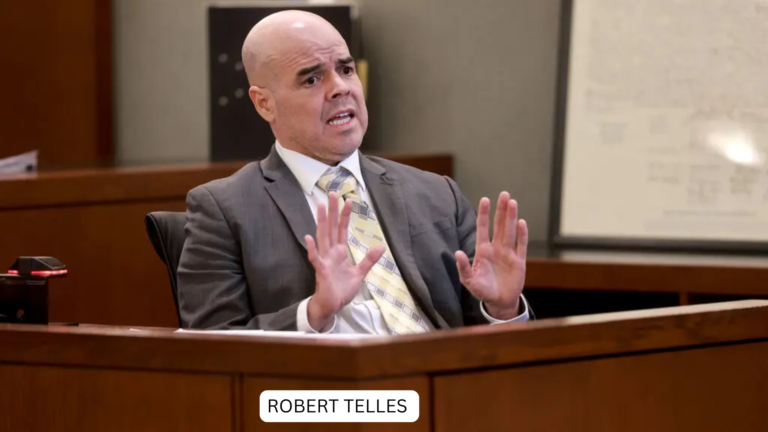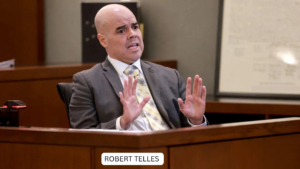Michael Jackson, the legendary “King of Pop,” remains an iconic figure whose influence on music and pop culture is unmatched. Yet, his life was marred by controversy, intense media scrutiny, and personal struggles that ultimately culminated in his untimely death in 2009. Over a decade later, questions still linger about what truly caused his demise. Recently, a startling revelation has come to light from an unlikely source—Michael Jackson’s former bodyguard. In an explosive account, the ex-guard offers new insights into the events and circumstances that may have contributed to the tragic end of the pop superstar’s life.
Michael Jackson’s death shocked the world, leaving millions of fans in mourning. The official cause of death was cardiac arrest brought on by acute propofol and benzodiazepine intoxication, but many have speculated that there was more to the story. Now, with the former bodyguard’s revelations, a different narrative emerges—one that paints a picture of a man overwhelmed by pressures, betrayal, and an ever-encroaching darkness.
The Life and Legacy of Michael Jackson: Before delving into the recent revelations, it’s important to remember the immense legacy that Michael Jackson left behind. With a career spanning over four decades, Jackson revolutionized the music industry, becoming a global icon with a unique style that blended pop, rock, and soul. His groundbreaking albums like Thriller, Bad, and Dangerous set records that still stand today, and his influence can be seen in countless artists who followed in his footsteps.
Jackson’s impact extended beyond music; he was also a masterful performer whose dance moves, particularly the moonwalk, became cultural phenomena. His humanitarian efforts, though sometimes overshadowed by his eccentricities, also demonstrated his desire to use his platform for good, supporting numerous charities and causes around the world.
However, Jackson’s life was far from idyllic. From his childhood in the spotlight as the lead singer of the Jackson 5 to his tumultuous adulthood filled with legal battles and allegations, Michael Jackson’s life was a complex web of fame, talent, and controversy.
The Role of the Former Bodyguard: The former bodyguard’s relationship with Michael Jackson offers a unique perspective on the pop star’s final years. Unlike the media, which often portrayed Jackson as a reclusive and troubled figure, the bodyguard was someone who spent significant time with him, offering protection and witnessing his day-to-day life.
In his role, the bodyguard was privy to many of Jackson’s private moments—both the highs and the lows. He saw firsthand the pressures that Jackson faced, from the demands of his career to the relentless scrutiny from the public and media. More importantly, he witnessed the toll that these pressures took on Jackson’s physical and mental health.
The bodyguard’s recent revelations suggest that there were underlying issues contributing to Jackson’s demise that went beyond the official cause of death. These insights, while difficult to hear, shed new light on the tragic final chapter of the “King of Pop’s” life.
The Pressure of Fame: One of the most significant factors that the bodyguard highlights is the immense pressure that Michael Jackson faced as one of the most famous people on the planet. From a young age, Jackson was thrust into the spotlight, and as he grew older, the demands on him only intensified. The constant need to produce hit records, perform at the highest level, and maintain his image took a heavy toll on Jackson’s mental and physical health.
The bodyguard describes a man who, despite his public persona, was deeply lonely and isolated. The pressures of fame, combined with the burden of being a global icon, left Jackson feeling trapped. He was constantly surrounded by people, yet he felt he had few he could truly trust. This isolation, according to the bodyguard, exacerbated Jackson’s struggles with anxiety, depression, and insomnia—issues that would eventually contribute to his reliance on medication.
The Role of Medication: Medication played a significant role in Michael Jackson’s life, particularly in his later years. The official cause of death—acute propofol and benzodiazepine intoxication—revealed that Jackson was using powerful sedatives to manage his chronic insomnia. However, the bodyguard’s account suggests that this reliance on medication was not simply about managing a sleep disorder but was also a way for Jackson to cope with the overwhelming stress and emotional pain he endured.
The bodyguard recalls Jackson’s struggles with sleep and how, over time, he became increasingly dependent on medication to get through the day. What began as a way to manage insomnia gradually turned into a dangerous dependency as Jackson sought relief from the constant pressure he faced. The bodyguard also raises concerns about the people around Jackson, including doctors and advisors, who may have enabled this dependency rather than helping him seek healthier alternatives.
The role of medication in Jackson’s death has been the subject of much debate, and the bodyguard’s revelations add a new dimension to this discussion. They suggest that Jackson’s dependency on medication was a symptom of deeper issues—issues that were exacerbated by those who should have been protecting him.
Betrayal and Exploitation: Another heartbreaking aspect of the bodyguard’s account is the sense of betrayal and exploitation that Michael Jackson experienced in his final years. Despite his fame and fortune, Jackson was surrounded by people who sought to take advantage of him. The bodyguard describes how Jackson’s trust was repeatedly betrayed by those he considered friends and advisors, many of whom were more interested in their own gain than in Jackson’s well-being.
This betrayal extended to his financial affairs, with the bodyguard suggesting that Jackson was manipulated into making decisions that were not in his best interest. As a result, Jackson’s financial situation became increasingly precarious, adding another layer of stress to his already burdened life.
The bodyguard’s revelations paint a picture of a man who was isolated, vulnerable, and taken advantage of by those around him. This exploitation, combined with the pressures of fame and the dependency on medication, created a perfect storm that ultimately contributed to Jackson’s tragic death.
The Impact on Michael Jackson’s Children: One of the most poignant aspects of the bodyguard’s account is the impact that Michael Jackson’s struggles had on his children—Prince, Paris, and Blanket. Jackson was a devoted father who loved his children deeply, and their well-being was always his top priority. However, the pressures he faced and his deteriorating health inevitably affected his ability to be the father he wanted to be.
The bodyguard describes how Jackson tried to shield his children from the chaos of his life, creating a protective bubble around them. Despite his best efforts, however, the children were not immune to the turmoil that surrounded their father. The bodyguard’s account suggests that Jackson’s declining health and the constant presence of outsiders in their lives created an environment of instability and uncertainty for the children.
In the years since Jackson’s death, his children have spoken openly about their struggles and the challenges they faced growing up in the shadow of their father’s fame. The bodyguard’s revelations add context to their experiences, highlighting the difficulties they endured and the strength they have shown in the years following their father’s death.
The Aftermath of Michael Jackson’s Death: The death of Michael Jackson marked the end of an era and left a void in the music world that has yet to be filled. In the immediate aftermath of his death, there was an outpouring of grief from fans around the world, along with a renewed interest in his life and career. However, the circumstances of his death also sparked controversy, leading to legal battles and further scrutiny of his life.
The trial of Dr. Conrad Murray, Jackson’s personal physician, brought many of these issues to the forefront. Murray was convicted of involuntary manslaughter for administering the dose of propofol that led to Jackson’s death. However, the bodyguard’s revelations suggest that Murray’s role was part of a larger, more complex web of factors that contributed to Jackson’s demise.
In the years since Jackson’s death, his legacy has continued to be the subject of debate. While his contributions to music and culture are undeniable, the controversies that surrounded his life have cast a long shadow. The bodyguard’s account adds another layer to this complex legacy, offering a perspective that highlights the personal struggles and betrayals that Jackson faced behind the scenes.
Conclusion: The revelations from Michael Jackson’s former bodyguard provide a sobering glimpse into the final years of the “King of Pop’s” life. They paint a picture of a man who, despite his immense talent and global fame, was deeply troubled and increasingly isolated. The pressures of fame, a reliance on medication, and the betrayal by those closest to him all played a role in his tragic death.
As fans and the public continue to reflect on Michael Jackson’s legacy, it’s important to remember not just the superstar who captivated the world with his music and performances, but also the human being who struggled with the same challenges and vulnerabilities that affect us all. The bodyguard’s account serves as a reminder that behind the public persona was a man who, like everyone else, sought love, trust, and understanding.
Michael Jackson’s death remains one of the most shocking and tragic events in modern pop culture history. While the official cause of death was determined years ago, the bodyguard’s revelations suggest that there is still much to understand about what really led to the loss of one of the most influential artists of all time. In the end, Michael Jackson’s legacy is one of extraordinary talent and enduring influence, but also of the profound challenges that can come with life in the spotlight.









